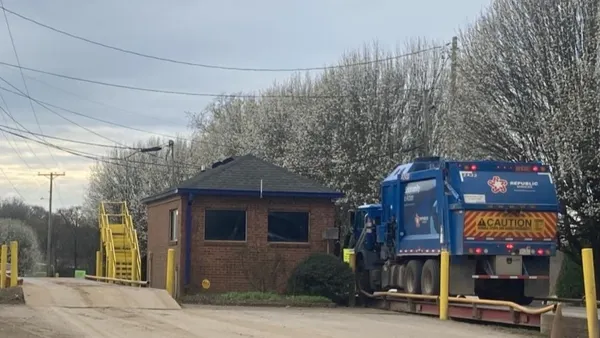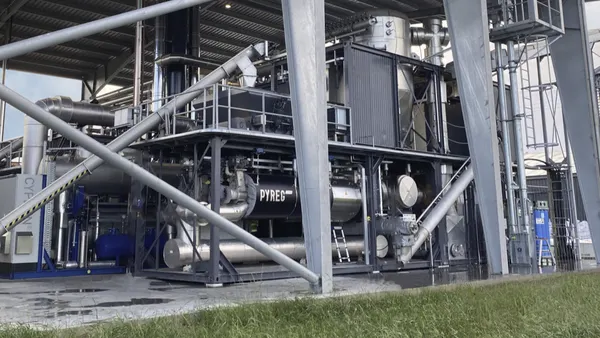UPDATE: Jan. 10, 2019: The U.S. House of Representatives passed H.R. 535 along a 247-159 vote. The bill targeting per- and polyfluoroalkyl substances (PFAS) notably gained support from around two-dozen Republicans, despite opposition from President Donald Trump, who has said he will veto the bill if it comes to the White House. After its overwhelming passage in the House, the bill is likely to lose momentum now, with Republicans in the Senate averse to taking up the measure.
Dive Brief:
- The U.S. House of Representatives is set to take up a bill (H.R. 535) this week that would nationally regulate at least some per- and polyfluoruoalkyl substances (PFAS). Among other significant components, the PFAS Action Act of 2019 would require the U.S. EPA to establish destruction and disposal guidance for a range of materials, including landfill leachate, biosolids, and "solid, liquid, or gas waste streams" from facilities that manufacture or use PFAS.
- It is likely the bill — which is set for a committee hearing on Tuesday afternoon — will see markups reducing impacts to chemical companies. The GOP-controlled Senate has also shown no interest in taking up the legislation. But disclosures show the waste industry's largest companies are lobbying on PFAS and trade groups have signaled the issue will be an important one in 2020.
- While some waste companies have been wary of PFAS legislation, others are open to the potential upside. Bill Fahey, a senior vice president with Veolia North America, told Waste Dive in a statement that regulations could create "an interesting and challenging opportunity in the hazardous waste space."
Dive Insight:
Lawmakers will consider the 47-page bill this week on the House floor, making it the first major piece of legislation taken up by the lower chamber in 2020.
Rep. Debbie Dingell (D-Mich.) originally introduced H.R. 535 in January 2019, seeking to declare PFAS as hazardous substances under Superfund law. The new iteration includes 11 other pieces of legislation following a review by the Energy and Commerce Committee late last year. Language requiring EPA to promulgate regulations for the disposal of PFAS-laden materials like firefighting foam is now included, mirroring themes from the PFAS Waste Incineration Ban of 2019 introduced last May by Rep. Ro Khanna (D-Calif.).
PFOA and PFOS, two of the most notorious PFAS, are the main target of H.R. 535. PFAS are likely in all landfills given their presence in the waste stream, but it still remains unclear just how Superfund designation might impact those sites. Melanie Benesh, a legislative attorney with the Environmental Working Group, told Waste Dive that Superfund cleanup processes are typically slow and it is hard to predict how regulations might play out.
"Landfills would want to be testing to see how much PFAS is in their leachate [regardless]," she said, with the caveat that those sites already monitor contaminants in waste.
The new bill follows a decline in momentum for other national efforts. In a blow for environment and health groups, key PFAS provisions were stripped from a must-pass defense spending bill at the end of last year. That last-minute move coincided with mounting pressure on EPA to regulate PFAS, including setting a maximum contaminant level for drinking water. The agency had said it would decide whether to regulate PFOA and PFOS by the end of 2019, but missed its own deadline.
While the new bill's full implications are still unclear, Fahey of Veolia emphasized potential opportunities. "The safe and efficient disposal of these chemicals will demand innovative solutions as companies across all industries seek out the ultimate cost-effective disposal of this contaminant," he said.
David Biderman, executive director and CEO for the Solid Waste Association of North America (SWANA), indicated to Waste Dive that among other things, the group is monitoring the potential financial implications of the legislation.
"The additional cost of monitoring, treating and removing PFAS from drinking water could exceed several billion dollars in just the first five years," he noted, citing a recent Congressional Budget Office estimate.
Biderman said he was not surprised the provisions taken out of the spending bill have re-emerged in the new legislation and indicated he expects the effort could clear the House before meeting hurdles in the Senate. But SWANA is also watching movements on a more local level.
"In the absence of federal action, SWANA expects state-level activity to accelerate in 2020," Biderman said, pointing to advancing efforts in Massachusetts, Maine, and Illinois. Other states, including New Hampshire, Vermont, and Michigan, are also scrutinizing the toxic substances.
Brandon Wright, vice president of communications for the National Waste and Recycling Association (NWRA), similarly confirmed to Waste Dive the group is closely monitoring PFAS legislation but is taking no formal stance on H.R. 535. He emphasized that the waste industry "doesn't create PFAS," echoing arguments some solid waste professionals have made in defending the sector and asserting scrutiny should be on chemical companies.
Still, federal lobbying disclosures show major waste companies remain active on the issue. In 2019, Waste Management reported spending on PFAS during Q2 and Q3 – including on the Khanna incineration bill. Republic Services also reported spending on general PFAS issues in both quarters.
Waste Management told Waste Dive the company is "currently reviewing H.R. 535 and other PFAS related bills at this time" while Republic did not respond to a request for comment.








